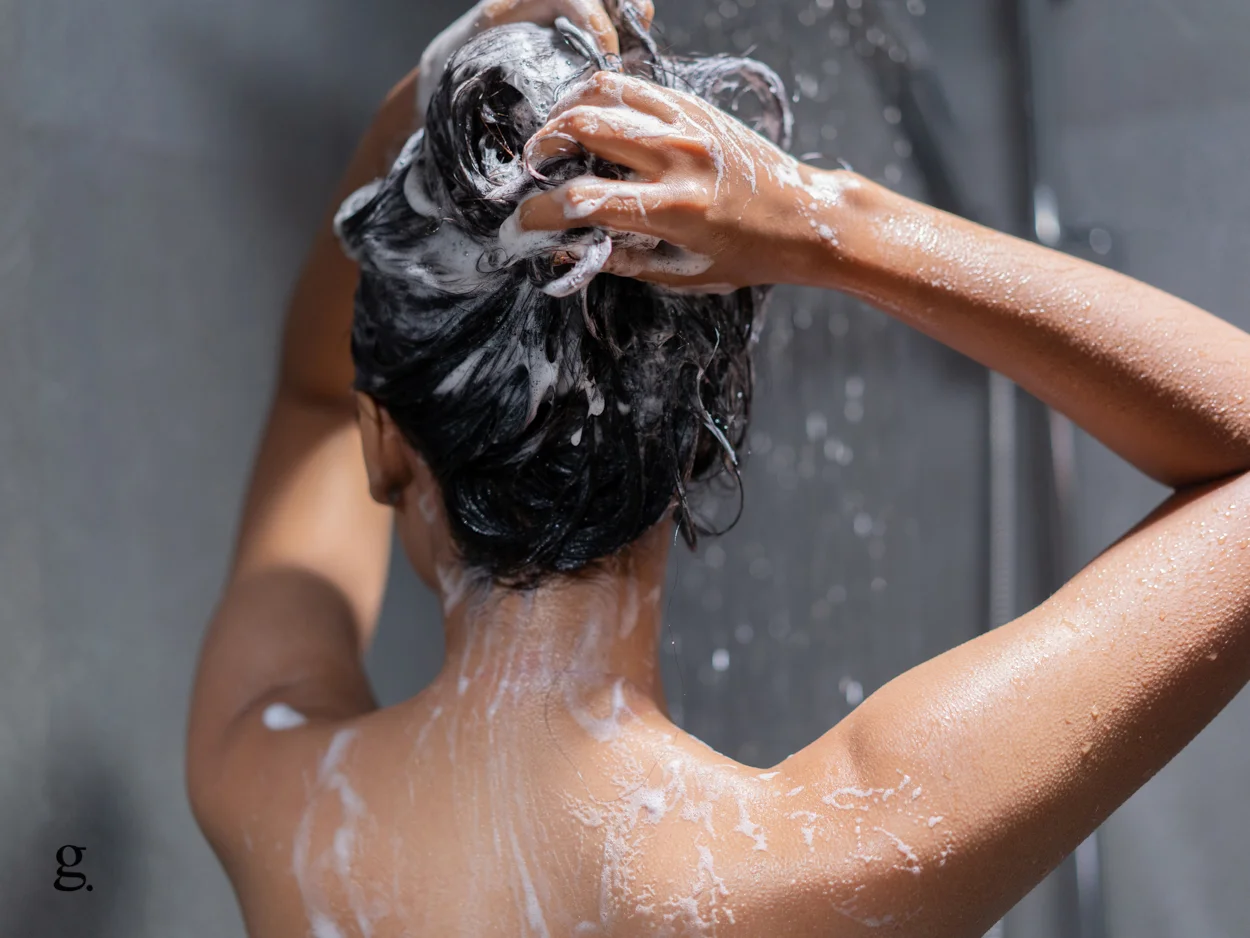Ever glanced at the shower drain and noticed a few more strands of hair than usual? It’s not your imagination—sometimes, the culprit behind hair loss is hiding right in your water supply. Hard water, which contains minerals like calcium and magnesium, can wreak havoc on your locks, leading to an array of problems.
What Is Hard Water?
Before pointing fingers at hard water, let’s first understand what it actually is. Hard water is simply water that contains high levels of minerals, primarily calcium and magnesium. These minerals make their way into the water supply as it flows through rocks and soil, picking up these elements along their journey.
You might be wondering how to tell if you have hard water at home. There are a few telltale signs to look out for. You may notice a filmy residue on your dishes, soap scum in your shower, or reduced lather when using soap. These pesky problems are all thanks to the minerals in hard water, which can form deposits and make it difficult for soap to dissolve properly.
Now that we have a better understanding of what hard water is, let’s delve into the possible effects it may have on your hair.
How Hard Water Impacts Our Hair
When it comes to your precious locks, hard water can be a bit of a troublemaker. The high mineral content in hard water can lead to several hair-related issues, including:
- Buildup: The minerals in hard water can accumulate on your hair and scalp, creating a stubborn buildup. This can weigh your hair down, making it appear dull, lifeless, and difficult to style.
- Dryness: Hard water can strip away your hair’s natural oils, leading to dry, brittle strands. This may cause your hair to become more prone to breakage and split ends.
- Scalp irritation: The mineral buildup on your scalp can potentially cause irritation, itching, and even flaking. This can be particularly bothersome for those with sensitive skin or pre-existing scalp conditions.
- Color fading: If you color your hair, hard water can be a real bummer. The minerals in hard water can react with the hair dye, causing your vibrant color to fade more quickly.
- Reduced lather: Hard water can make it difficult for shampoo and other hair products to lather up properly. This may leave your hair feeling less clean and even a bit greasy, despite your best efforts to wash it thoroughly.
Can It Cause Hair Loss?
Now, let’s get down to brass tacks—can hard water actually cause hair loss? The answer isn’t as clear-cut as you might expect. While hard water itself isn’t a direct cause of hair loss, the problems it creates for your hair and scalp can contribute to thinning locks and, in some cases, hair shedding. To better understand this, let’s break down the different ways hard water can indirectly affect hair loss.
Scalp Irritation and Inflammation
As mentioned earlier, the mineral buildup from hard water can lead to scalp irritation and dryness. When your scalp is irritated and inflamed, it can potentially weaken the hair follicles and disrupt the hair growth cycle. An unhealthy scalp environment can make it difficult for hair to grow and lead to weaker strands that are more susceptible to breakage. This, in turn, may cause an increase in hair shedding and overall hair thinning.
Dryness and Brittleness
Hard water can make your hair more prone to dryness and brittleness due to the stripping of natural oils and the mineral buildup on your hair strands. This lack of moisture can cause your hair to become weak and more prone to breakage, which might give the appearance of hair loss. However, it’s essential to remember that this type of breakage isn’t the same as hair loss from the follicle. Hair that breaks off due to dryness and brittleness still has the potential to regrow from the root, unlike hair that is lost from a damaged follicle.
Disruption of Hair Products
Hard water can also interfere with the effectiveness of your hair care products. It can reduce the lathering ability of your shampoo and create a barrier that prevents your conditioner from properly moisturizing your hair. This can result in less effective cleansing and conditioning, which may contribute to a less healthy scalp and hair environment. In turn, this can exacerbate hair shedding and thinning.
Stress on Hair
The combination of mineral buildup, scalp irritation, dryness, and reduced product effectiveness can put additional stress on your hair. This stress can cause your hair to become more susceptible to damage and breakage, which can contribute to the appearance of hair loss. Moreover, if you’re constantly dealing with tangled, unmanageable hair due to hard water, you might be more likely to pull and tug at your hair, further increasing the risk of breakage and hair loss.
In summary, while hard water doesn’t directly cause hair loss, the issues it creates for your hair and scalp can contribute to increased shedding and the appearance of thinning hair. By addressing the challenges posed by hard water, you can help maintain a healthier scalp and hair environment, reducing the risk of hair loss.
Should You Be Worried About Hard Water?
If you suspect that hard water might be messing with your mane, it’s natural to feel a little concerned. However, there’s no need to panic. While the effects of hard water on your hair and scalp can be frustrating, they’re usually not something you need to worry about too much.
When it comes to hair loss related to hard water, the good news is that it’s usually not permanent. The hair shedding and thinning caused by hard water are generally temporary, and once you address the issue, your hair should begin to recover and regain its strength.
Should you implement solutions to combat hard water (more on that later), you’ll likely notice an improvement in the overall health and appearance of your hair. As your hair and scalp become healthier, the rate of shedding should decrease, and your hair should start to look thicker and more vibrant.
Keep in mind that everyone’s hair is different, and what might be a minor annoyance for one person could be a significant issue for another. If you’re experiencing persistent hair loss, it’s always a good idea to consult with a dermatologist or a hair specialist to rule out other underlying causes and receive personalized advice for your specific situation.
What To Do If You’ve Got Hard Water
If you’re dealing with hard water and its effects on your hair, don’t fret—there are several steps you can take to combat the issue and keep your locks looking their best:
- Invest in a shower filter: A shower filter is a simple and effective way to reduce the mineral content in your water. These filters can be easily installed on most showerheads and help to remove excess calcium and magnesium, giving your hair a fighting chance against hard water.
- Use a clarifying shampoo: To help combat mineral buildup, consider incorporating a clarifying shampoo into your hair care routine once or twice a week. These shampoos are specially designed to remove product and mineral buildup, leaving your hair feeling clean and refreshed.
- Try a chelating treatment: If you’re dealing with severe mineral buildup, a chelating treatment may be in order. Chelating treatments use special ingredients to bind to and remove minerals from your hair. These treatments can be found at some salons or purchased as at-home kits.
- Moisturize, moisturize, moisturize: Since hard water can strip your hair of its natural oils, it’s crucial to keep your locks well-moisturized. Use a nourishing conditioner and consider adding a deep conditioning treatment to your routine to help combat dryness and brittleness.
- Be gentle with your hair: To reduce breakage, handle your hair with care, especially when it’s wet. Use a wide-toothed comb to detangle, and avoid using heat-styling tools when possible. If you must use heat, always apply a heat protectant to minimize damage.
Conclusion
While hard water can be a nuisance for your hair, causing issues like buildup, dryness, and scalp irritation, it’s typically not a direct cause of hair loss. However, the problems it creates can contribute to increased shedding and the appearance of thinning hair. Thankfully, hard water-related hair loss is usually temporary, and by addressing the issue with practical solutions, you can help your hair bounce back to its former glory.
From investing in a shower filter to using clarifying shampoos and moisturizing treatments, there are various ways to minimize the impact of hard water on your hair. Just remember that if you continue to experience persistent hair loss, it’s essential to consult a professional to rule out other potential causes and receive personalized guidance.
So, don’t let hard water rain on your hair parade. By taking proactive steps to protect your locks, you can enjoy healthy, beautiful hair—no matter what your water supply throws your way.

